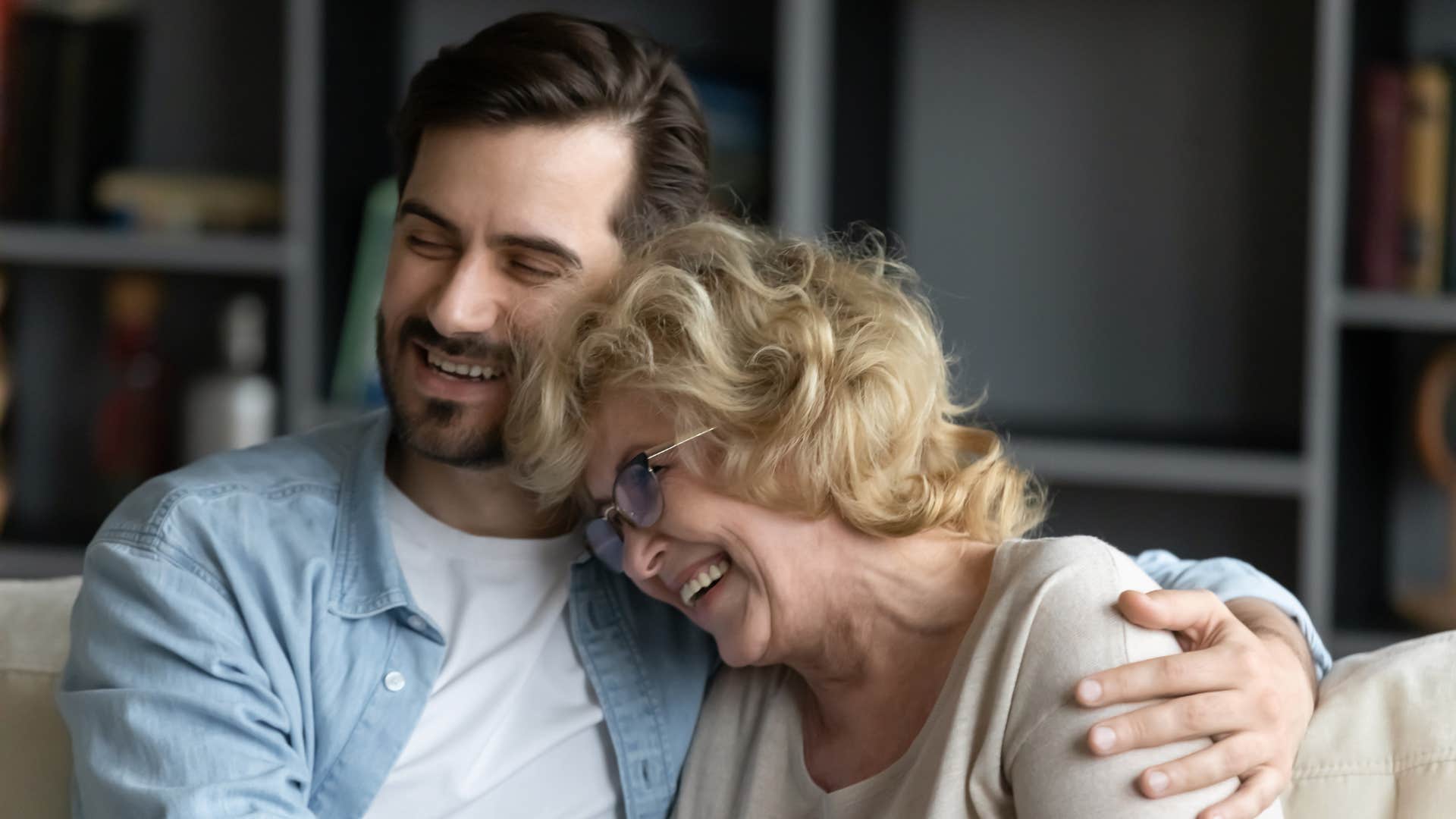11 Phrases People Use When They Were Not Raised By Classy Parents
The words we use are often shaped by unseen struggles.
 HBRH / Shutterstock
HBRH / Shutterstock Words carry more weight than we often realize. The sayings we use on a regular basis aren’t just random combinations of sounds, they’re echoes of the lives we’ve lived and have been shaped by the environments in which we were raised. For some, these words are a testament to resilience, survival, or a lack of access to the finer nuances of cultured speech, and because of this, there are phrases people use when they weren't raised by classy parents.
When class and refinement weren’t taught at home, language can become an unpolished reflection of an upbringing that was anything but ordinary. What we choose to say to others offers them insight into the unspoken realities that shaped who we are and remind us all that behind every word, there’s a life lived and a lesson learned.
Here are 11 phrases people use when they were not raised by classy parents
1. 'This is who I am, take it or leave it.'
 ViDI Studio | Shutterstock
ViDI Studio | Shutterstock
Children raised in households where tough love was the norm often grew up believing that a take it or leave it attitude was a badge of honor. Strength was measured by how little you bent for others. While that kind of toughness can function as a survival skill, it often signals an unwillingness to grow or to truly consider the feelings and perspectives of others.
The intent behind tough love is often to encourage resilience, responsibility, and personal growth. That said, how it’s received by young adults can vary greatly depending on the communication style of their parents.
Research has shown that communication serves as an important factor in the healthy relationship dynamics between parents and their young adult children. When tough love is applied without warmth, it can be misinterpreted as rejection.
2. 'Why should I say thank you? It's your job.'
 PaeGAG | Shutterstock
PaeGAG | Shutterstock
When a person says this to a server or at a job, it offers a view into an upbringing where gratitude likely wasn’t taught and kindness was probably seen as a weakness. In homes where survival came before sensitivity and you either got along or pushed out, children quickly learn that showing vulnerability is a liability.
While this tough exterior might seem like strength, it's often a defense mechanism meant to protect themselves from scrutiny. Research has shown that poor treatment of someone people deem beneath them is frequently rooted in a social status imbalance that favors one party over another, reinforcing a hierarchy that enables hostility and abuse.
3. 'I say what I think, I don't sugarcoat.'
 Dikushin Dmitry | Shutterstock
Dikushin Dmitry | Shutterstock
People who say this phrase weren’t raised by classy parents who taught them to play nice just to keep the peace. They say what they mean and mean what they say. There’s no sugarcoating and no filters, just the raw and straight up truth.
Some might call them rude, but they consider themselves real. They’re not out here trying to win popularity contests or tiptoe around anyone’s fragile ego. If something needs to be said, they’ll say it. Rather than being taught to smile through gritted teeth, they were raised to speak up and stand firm.
Being direct is often about being honest in order to avoid misunderstandings. These people don’t have time for sugarcoating or pretending. To them, it’s more important to be truthful than to worry about how what they say lands.
4. 'I don't owe anyone anything.'
 fizkes | Shutterstock
fizkes | Shutterstock
Growing up, people who say this were taught that the world doesn’t owe anyone anything, and that mindset stuck with them. They aren’t here to please anybody and they don't care what people think. They believe life is too short to worry about others' expectations. When something goes wrong, they just say, 'Figure it out yourself,' because that's how they were raised.
"Some parents can make their grown-up sons and daughters feel almost guilty for growing up," says Iskra Fileva Ph.D.
The older they get, the more they realize that their life is theirs to live and they’re not obligated to live up to anyone else’s standards or guilt trips.
5. 'People are too sensitive these days.'
 Josep Suria | Shutterstock
Josep Suria | Shutterstock
In today's world, it often feels like everyone is too sensitive. People get offended by the smallest things and it's like you can't say anything anymore without someone freaking out. People who say things like this weren't raised by parents who valued emotional intelligence. Instead, they grew up seeing sensitivity as a flaw.
"High sensitivity is a genetic trait, not a mental health diagnosis," says Mary Kate Roohan Psy.D.
But how that sensitivity is shaped and responded to in childhood can have a profound impact. Being raised without warmth or grace doesn't make people stronger, it makes them guarded.
6. 'I don't need to impress anyone.'
 stockfour | Shutterstock
stockfour | Shutterstock
People who say this weren’t raised by parents who cared about appearances or who taught them how to navigate polite society. So now, as adults they carry that same energy.
As Guy Winch Ph.D., explains, "Authentic pride arises when we feel good about ourselves, confident, and productive, and is related to socially-desirable personality traits such as being agreeable, conscientious, and emotionally stable."
In contrast, he notes, "Hubristic pride tends to involve egotism and arrogance, and is related to socially undesirable traits such as being disagreeable, aggressive, having low or brittle self-esteem and being prone to shame."
People who don't feel a need to impress anyone see absolutely no reason for putting on a show or pretending to be something that they are not, and while that can be a blessing in disguise, it can also make them seem arrogant.
7. 'I don't care what people think.'
 shurkin_son | Shutterstock
shurkin_son | Shutterstock
People who don't care what others think often come from homes where appearances weren't a priority and social etiquette wasn't taught or valued. They weren't raised to smile politely, blend in, or worry about keeping up with anyone else. Instead, they were taught to stand their ground, speak their mind and never depend on outside validation.
As adults, that shows up in the way they move through the world, unapologetically. They didn't have parents who helped them to navigate social situations with class and sensitivity.
"It's not possible, or necessary, to care about everything. But 'not caring' about critical things can put someone on a slippery slope to immoral behavior," says Peg O'Connor Ph.D.
Without guidance in understanding how to balance authenticity with empathy, they might overlook the importance of kindness, fairness, and respect.
8. 'Why would I dress up? It's just dinner.'
 InesBazdar | Shutterstock
InesBazdar | Shutterstock
People like this weren't raised with an emphasis on social decorum or keeping up with appearances. In their homes, the focus was never on dressing for the occasion. Instead, they were taught to prioritize comfort and practicality over style or status. They believe that having a good time shouldn’t be dependent on them looking fancy. To them, appearances are secondary.
However, dressing nicely can show others that you care enough about them to go the extra mile. Research shows that what you wear can influence your behavior. In a process called 'enclothed cognition,' dressing up in a lab coat improved the mental health and the productivity of the wearer. Another example would be dressing up for work even if you work from home, which can be a great way to trick your mind into being more productive.
9. 'That's not my problem.'
 Cast Of Thousands | Shutterstock
Cast Of Thousands | Shutterstock
We've all been placed in situations where something is not our problem but we might have the means to help or assist someone else. People who say this phrase weren't taught the value of stepping in to help others or the importance of considering how their actions affect those around them. Instead, they learned to focus solely on themselves, thinking that anything outside of their immediate concern didn’t warrant their attention.
Minding one’s own business is not inherently a bad thing, especially when it feels like others have been taking advantage of you. Protecting your own space and focusing on your own needs can be a healthy response to feeling overwhelmed or exploited.
However, as Jennifer L. Keluskar Ph.D. states, "Not caring about others is a flaw with society, but too much of the opposite can also be a problem."
When people are raised without the balance of empathy and responsibility, they may adopt a mindset of detachment that will eventually become a slippery slope.
10. 'Respect is earned, not given.'
 Miljan Zivkovic | Shutterstock
Miljan Zivkovic | Shutterstock
In the childhood homes of people who say this, respect wasn't something automatically extended based on age, status, or authority, but instead it was something that had to be proven. While this approach created a sense of self-reliance and independence, it could also make them seem cold or combative in environments where mutual respect and courtesy are expected.
This belief often carries into adulthood, where they're quick to dismiss anyone who demands respect without proving themselves. However, this saying is a fallacy, as respect should always be given if a person is kindhearted and treats others with respect, regardless of position or status.
11. 'They should just get over it.'
 Branislav Nenin | Shutterstock
Branislav Nenin | Shutterstock
When people who say this were children, there wasn’t much attention given to the complexities of others’ feelings. Conflict and emotional turmoil were often brushed aside. As a result, they grow into adults who have little regard for the emotional impact of their actions. Parents who didn’t emphasize emotional awareness and kindness in the household also never taught their children that their behaviors have consequences.
For instance, after a relationship, someone might dismiss their ex’s feelings and make fun of them because they have not gotten over the relationship. This shows a lack of understanding that emotional healing takes time and that the breakup affected the other person in a different way.
When people weren't raised by classy parents, they may not have learned the importance of giving others consideration or empathy. Instead of asking how the other person is feeling, they focus and hold onto how they think that person should handle things.
Sylvia Ojeda is an author who has over a decade of experience writing novels and screenplays. She covers self-help, relationships, culture, and human interest topics.

